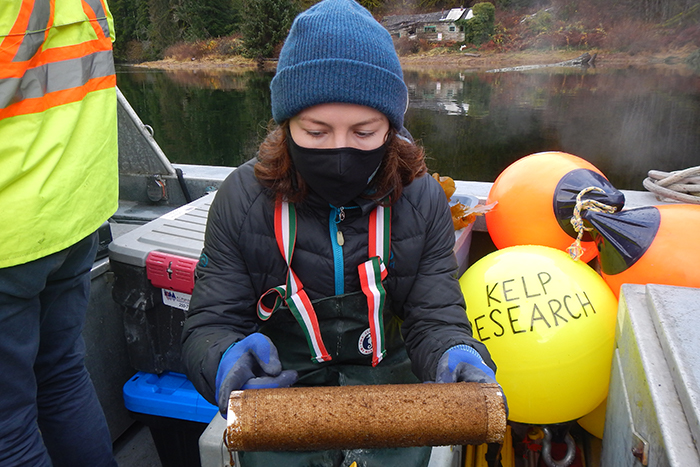A three-year project to plant kelp at log storage and handling marine sites on Vancouver Island is taking shape.
North Island College’s Centre for Applied Research is among the partners. It’s working alongside M.C. Wright & Associates Ltd. and BC Timber Sales (BCTS).
The goal is to use planted kelp to support the marine habitat, in areas where woody debris from log storage and handling has built up on the ocean floor.
“Forestry is the largest resource sector on Vancouver Island and one of the sector’s major challenges is containing and mitigating the negative impacts of logging on coastal habitat,” said Allison Byrne, NIC lead researcher.
“Kelp naturally provides food and habitat for many different species while improving water quality. Planted kelp beds have the potential to create marine habitat and/or rehabilitate degraded marine habitat.”
M.C. Wright and Associates Ltd. president Mike Wright approached NIC about the possibility of collaborating on a kelp project to expand the ‘toolbox’ when it comes to habitat rehabilitation.
“I have been looking at expanding on the kelp propagation research we completed in 2013,” Wright said.
“Given the decline of kelp forests throughout coastal British Columbia, I felt that more research was needed to refine the technique. Through further refinement of the methods developed and adding new Kelp Propagation techniques to the toolbox, I feel that rehabilitating impacted habitat with kelp forests will help in creating more of this important three-dimensional habitat for marine organisms.”
“Through early discussions with the college, I felt that NIC was an organization that could bring a high level of credibility to the program and bring an educational component to this research. The project will allow us to bring students in to do direct studies with us. Having the college involved also gives us the capability to expand the project every year.”
The researchers are testing different species of kelp and different planting methods at four BC Timber Sales sites to determine what combination of site conditions and kelp planting techniques provide the most effective habitat.
“BC Timber Sales is excited about the opportunities kelp provides,” said Kerri Brownie, stewardship officer with BCTS.
“BCTS recognizes there is significant carbon sequestration in kelp beds and is interested in measuring the levels of carbon sequestered in order to assess the effects of climate change. Engagement on projects such as this one is part of our Climate Change Action Plan.”
Planting started last March, and the research team monitored kelp growth throughout the spring and summer.
Byrne says the results are promising and may have wide application.
“We are seeing clear differences in kelp growth based on how and where it was planted,” said Byrne.
“The results will help the industry partners, and potentially other companies, make informed decisions about future marine habitat banks by examining what site conditions and kelp cultivation techniques were or were not successful during our trials.”
The project is funded by an Applied Research and Development grant from the Natural Sciences and Engineering Research Council (NSERC), in addition to contributions from the project’s partners.
You can find more information on CARTI projects, or learn about working with CARTI on applied research projects, here.






